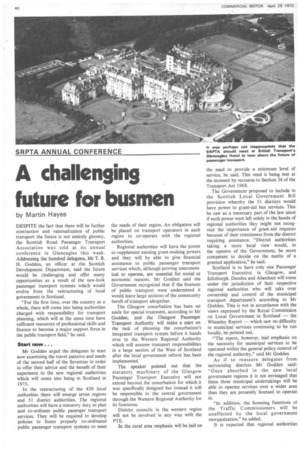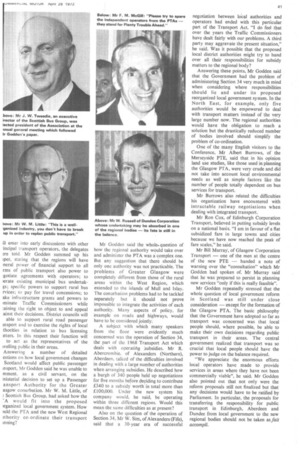A challenging future for busmen
Page 42

Page 43

If you've noticed an error in this article please click here to report it so we can fix it.
by Martin Hayes
DESPITE the fact that there will be further contraction and rationalization of public transport the future is not entirely gloomy, the Scottish Road Passenger Transport Association was told at its annual conference in Gleneagles this week. Addressing the hundred delegates, Mr T. R. H. Godden, an officer at the Scottish Development Department, said the future would be challenging and offer many opportunities as a result of the new-look passenger transport systems which would evolve from the restructuring of local government in Scotland.
"For the first time, over the country as a whole, there will come into being authorities charged with responsibility for transport planning, which will at the same time have sufficient resources of professional skills and finance to become a major support force in the public transport field," he said.
Start now . . .
Mr Godden urged the delegates to start now examining the travel patterns and needs of the second half of the Seventies in order to offer their advice and the benefit of their experience to the new regional authorities which will come into being in Scotland in 1975.
In the restructuring of the 430 local authorities there will emerge seven regions and 51 district authorities. The regional -authorities will have a statutory duty to plan and co-ordinate public pasenger transport services. They will be required to develop policies to foster properly co-ordinated public passenger transport systems to meet
the needs of their region. An obligation will be placed on transport operators in each region to co-operate with the regional authorities.
Regional authorities will have the power to supplement existing grant-making powers and they will be able to give financial assistance to public passenger transport services which, although proving uneconom ical to operate, are essential for social or economic reasons. Mr Godden said the Government recognized that if the finances of public transport were undermined it would leave large sections of the community bereft of transport altogether.
The Glasgow conurbation has been set aside for special treatment, according to Mr Godden, and the Glasgow Passenger Transport Authority will make a start on the task of planning the conurbation's integrated transport system before it hands over to the Western Regional Authority which will assume transport responsibilities in a large section of the West of Scotland after the local government reform has been implemented. The speaker pointed out that the statutory machinery of the Glasgow Passenger Transport Executive will not extend beyond the conurbation for which it was specifically designed but instead it will be responsible to the central government through the Western Regional Authority for its functions.
District councils in the western region will not be involved in any way with the PTE.
In the rural area emphasis will be laid on the need to provide a minimum level of service, he said. This need is being met at the moment by recourse to Section 34 of the Transport Act 1968.
The Government proposed to include in the Scottish Local Government Bill provision whereby the 51 districts would have power to grant-aid bus services. This lie saw as a necessary part of the law since if such power were left solely in the hands of regional authorities they might not recognize the importance of grant-aid requests because of their remoteness from the district requiring assistance. "District authorities taking a more local view would, in the opinion of the Government, be more competent to decide on the merits of a granted application," he said. Scotland is to have only one Passenger Transport Executive, in Glasgow, and Edinburgh, Dundee and Aberdeen will come under the jurisdiction of their respective regional authorities who will take over ownership and control of the municipal transport department's according to Mr Godden. This is not in accordance with the views expressed by the Royal Commission on Local Government in Scotland — the Wheatley Report — which saw no difficulty in municipal services continuing to be run locally, he pointed out.
."The report, however, laid emphasis on the necessity for municipal services to be operated within the general policy control of the regional authority," said Mr Godden.
As if to reassure delegates from surroundng districts Mr Godden said: "Once absorbed in the new local government regions it is not envisaged that these three municipal undertakings will be able to operate services over a wider area than they are presently licensed to operate "In addition, the licensing functions of the Traffic Commissioners will be unaffected by the local government reorganization," he added. It is expected that regional authorities ill enter into early discussions with other incipal transport operators, the delegates z.re told. Mr Godden summed up his tper, stating that the regions will have neral power of financial support to all rrns of public transport also power to :gotiate agreements with operators; to erate existing municipal bus undertakgs; specific powers to support rural bus rvices; to pay for travel concessions; to ake infrastructure grants and powers to ■ minate Traffic Commissioners while :aining the right to object to and appeal ainst their decisions. District councils will able to support rural road passenger import and to exercise the rights of local thorities in relation to bus licensing uters. In this respect their function will to act as the representatives of the welling public in their areas.
Answering a number of detailed estions on how local government changes Scotland would affect public passenger xi sport, Mr Godden said he was unable to mment. as a civil servant, on the inisterial decision to set up a Passenger ansport Authority for the Greater asgow conurbation. Mr W. M. Little, of ; Scottish Bus Group, had asked how the 'A would fit into the proposed irganized local government system. How aild the PTA and the new West Regional ithorit3.,7 co-ordinate their transport Ln ning? Mr Godden said the whole.question of how the regional authority would take over and administer the PTA was a complex one. But any suggestion that there should be only one authority was not practicable. The problems of Greater Glasgow were completely different from those of the rural areas within the West Region, which extended to the islands of Mull and Islay. The conurbation problems had to be tackled separately but it should not prove impossible to integrate the activities of each authority. Many aspects of policy, for example on roads and highways, would have to be considered jointly.
A subject with which many speakers from the floor were evidently much concerned was the operation of Section 34, the part of the 1968 Transport Act which deals with operatihg Subsidies. Mr R. Abercrombie. of Alexanders (Northern), Aberdeen, talked of the difficulties involved in dealing with a large number of authorities when arranging subsidies. He described how a burgh of 340 people held up negotiations for five months before deciding to contribute £340 to a subsidy worth in total more than £100,000. Under the new system his company would, he said, be operating within three different regions. Would this mean the same difficulties as at present?
Also on the question of the operation of Section. 34, Mr W. Sim, of Alexanders (Fife), said that a 30-year era of successful negotiation between local authorities and operators had ended with this particular part of the Transport Act. "I do feel that over the years the Traffic Commissioners have dealt fairly with our problems. A third party may aggravate the present situation," he said. Was it possible that the proposed local district authorities might try to hand over all their responsibilities for subsidy matters to the regional body?
Answering these points, Mr Godden said that the Government had the problem of administering Section 34 very much in mind when considering where responsibilities should lie and under its proposed reorganized local government system. In the North East, for example, only five authorities would be empowered to deal with transport matters instead of the very large number now. The regional authorities would •have the obligation to reach a solution but the drastically reduced number of bodies involved should simplify the problem of co-ordination.
One of the many English visitors to the Conference, Mr Albert Burrows, of the Merseyside PTE, said that in his opinion land use studies, like those used in planning the Glasgow PTA, were very crude and did not take into account local environmental needs as well as simple factors like the number of people totally dependent on bus services for transport.
Mr Burrows also related the difficulties his organization have encountered with intractable railway negotiations when dealing with integrated transport.
Mr Ron Cox, of Edinburgh Corporation Transport, believed in putting subsidy levels on a national basis. "I am in favour of a flat subsidized fare in large towns and cities because we have now reached the peak of fare scales," he said.
Mr Bill Murray, of Glasgow Corporation Transport — one of the men at the centre of the new PTE — handed a note of warning over the "consultation" which Mr Godden had spoken of. Mr Murray said that he was prepared to persist in planning new services "only if this is really feasible".
Mr Godden repeatedly stressed that the whole question of local government reform in Scotland was still under close consideration — except for the formation of the Glasgow PTA. The basic philosophy that the Government have adopted so far as transport was concerned was that local people should, where possible, be able to make their own decisions regarding public transport in their areas. The central government realized that transport was so crucial that local people should have the power to judge on the balance required.
"We appreciate the enormous efforts local operators have made to provide services in areas where they have not been commercially viable", he said. Mr Godden also pointed out that not only were the reform proposals still not finalized but that any decisions would have to be ratified by Parliament. In particular, the proposals for transferring the responsibility for public transport in Edinburgh, Aberdeen and Dundee from local government to the new regional bodies should not be taken as fair accompli.








































































































